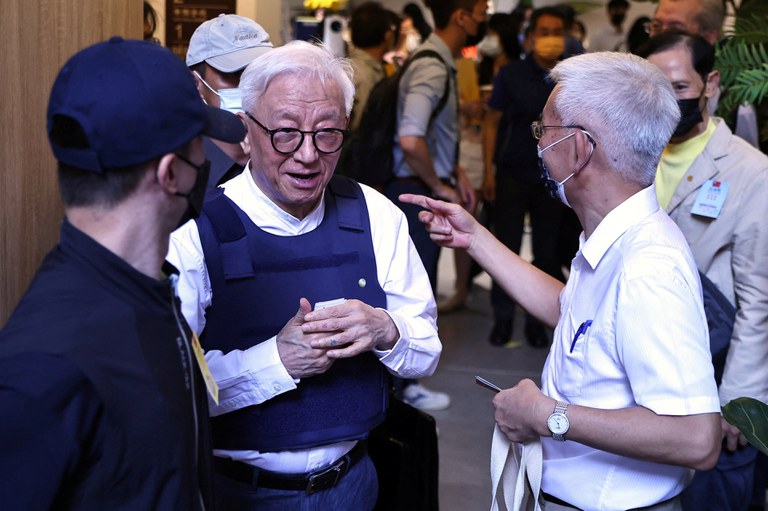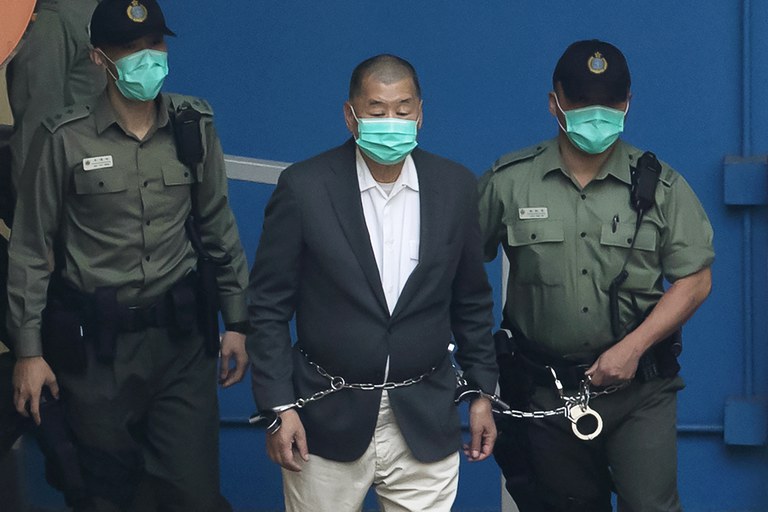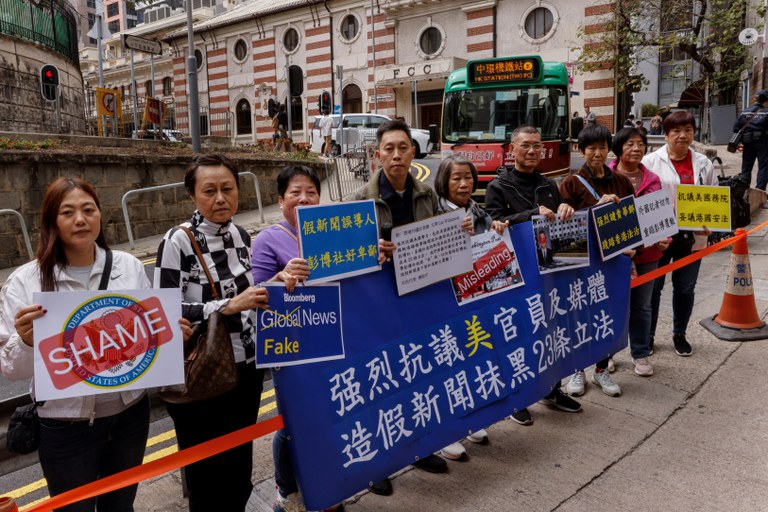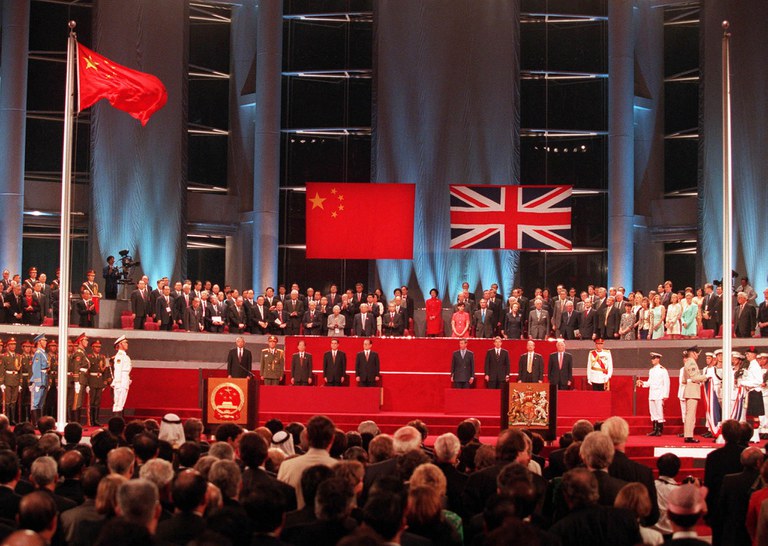For Hong Kong journalists, there is absolutely no room for old habits, even if they die hard.
The city’s second national security law passed swiftly last week has widened the scope of what constitutes a breach of national security. It has also raised the risk of news reporting which has already increased since the Beijing-imposed first law came in 2020 and China increasingly encroached on the city.
“What had been habitually acceptable, normal practice before, is no longer the case,” said a veteran journalist who declined to be named. “Journalists have to relearn and recalibrate.”
This means throwing into the wind best practices in journalism. In their place, the most experienced practitioners are learning by reviewing daily how government officials posture and how the court rules, the veteran journalist told Radio Free Asia.
Another seasoned journalist who also spoke on condition of anonymity said while the immediate effects of the new law officially known as the Safeguarding National Security Ordinance have yet to be seen, the editorial process – from a journalist reporting the news to editors editing the story for publication – has become much more complex.
“For instance, if you have a scoop on a new government policy – would you report and publish that or would it be a breach of law? We don’t know what is considered lawful or what can become questionable,” the seasoned journalist explained, echoing the veteran journalist’s view of the unease that has been clouding the media since 2020.
The change in journalistic practices started nearly four years ago, after China’s parliament passed the National Security Law. However, the introduction of the Safeguarding National Security Ordinance last week, also referred to as Article 23 based on a clause in Hong Kong’s mini constitution, the Basic Law – has intensified the concerns and uncertainties that Hong Kong journalists have faced over the past few years.
While there are overlaps with the first law, Article 23 has also created new offenses, given increased punishment for offenders and afforded the government sweeping new powers to crack down on all forms of dissent on the grounds of treason, insurrection, sabotage that endangers national security, external interference in Hong Kong’s affairs, and espionage and theft of state secrets.
“National security” in Article 23 is defined as identical to the first law, by China’s definition, which journalists and critics viewed as vague and heightened uncertainties.
In both laws, national security refers to “the status in which the state’s political regime, sovereignty, unity and territorial integrity, the welfare of the people, sustainable economic and social development, and other major interests of the state are relatively free from danger and internal or external threats, and the capability to maintain a sustained status of security.”

Under Article 23, insurrection and sabotage can be punished with life imprisonment. Jail terms for sedition are increased from two years to seven, or 10 if alleged perpetrators are found to have colluded with a foreign force.
The law also allows for a lengthening detention period without charge from 48 hours to two weeks, as well as expanded the British colonial-era offense of “sedition” to include inciting hatred against the leadership of the Chinese Communist Party.
The Hong Kong government had not responded to Radio Free Asia’s request for comment on Article 23’s effect on journalists at the time of publication.
When uncertain, self censor
Journalists who remained in the field observed that self censorship is now second nature in the profession and on the increase in Hong Kong, once Asia’s bastion of free press and expression, and one of the very virtues that helped propel the city to an international financial center.
“Before, you just report the news; as balanced as you can be, after getting all sides of the issue. Now, you would think twice and more times, whether to even report. It’s become a collective decision involving more editors and often lawyers,” said the seasoned journalist. “Or you simply don’t report.”
Article 23 can also apply to actions that take place outside Hong Kong – by both residents and businesses – a move seen as key to what critics described as China’s “long arm” to hunt down overseas pro-democracy activists and “anti-China elements.”
“It also makes reporting about overseas protests as journalists previously did, risky because you might be seen as providing a platform to these organizations abroad,” pointed out the veteran journalist, adding that these days, the approach is to wait for an official line from the Hong Kong government before publication of such types of news.
Indeed, Hong Kong media outlets were sparing in coverage of overseas protests against the first day of Article 23’s implementation on Saturday. When they did, the angle was to convey the annoyance of citizens of foreign cities unsettled by the chaos created by the demonstrations.
A case in point: HK01, an online news portal in Hong Kong, reported Saturday on disgruntled Taiwanese people who told protesters, many of whom were immigrants from Hong Kong, at a Taipei rally to “go back to Hong Kong” and not to mess up Taiwan.

At the same reported Taipei event in the bustling Ximen district, demonstrators were joined by Robert Tsao, founder of chip-making giant United Microelectronics Corporation and former Hong Kong resident, who blasted the Chinese Communist Party for upholding authoritarianism in the guise of national security and through the “laughable” concept of “subverting the nation” when the country and regime are separate notions.
“The CCP has tied the political regime with the country, which is a scam and extremely absurd,” Tsao said, as he warned that the fate of Taiwan and Hong Kong are inextricably linked. If Taiwan isn’t cautious, it could become the next Hong Kong.
Sea of change
Hong Kong’s stifled media environment is part of the sea of change that has resulted in a suppressed political environment where political organizations, civil societies and media outlets have been shuttered, and journalists, former lawmakers and academics self-exiled. All under the shadow of the first national security law.
Among these are the high-profile closure of Apple Daily in June 2021 and the ongoing trial of its founder Jimmy Lai, accused of colluding with foreign forces and publishing seditious articles, as well as the trial of Chung Pui-luen and Patrick Lam, former editors of the shuttered digital media outlet Stand News.
Apple Daily, which stood for the public’s voice for democracy, had been ostracized by Beijing long before the 2019-2020 protests across the city, triggered by the Hong Kong government’s proposed extradition bill to establish a mechanism for transfers of fugitives for Taiwan, Macau and mainland China, excluded in the existing laws. The demonstrations picked up traction as the public saw the proposed bill challenging the bottomline to their basic rights – the rule of law.
Adherence to the rule of law under the predictable common law framework was what the over seven million Hong Kong people are familiar with, and which is what separated the former British colony from China.
Lai and Apple Daily came under Beijing’s intensified wrath amid the mass demonstrations of 2019 and the CCP’s growing encroachment despite the “one country, two systems” principle that promises to leave Hong Kong’s self governance, except in the areas of defense and diplomacy, intact until 2047.

Because the national security law – and now Article 23 – isn’t retroactive, there’s really no benchmark, which makes the Lai and Stand News trials pivotal to navigating the future news reporting scene in the city.
“At present, the overall environment is very bad,” the veteran journalist said.
Rawest nerve
The veteran journalist believes that out of all of the CCP’s national security fears over Hong Kong, the biggest is “collusion with external forces to pressure China,” given the city’s Westernized system and history of foreign engagement which ironically is instrumental to its success.
“The party is looking at it from the conspiratorial perspective to national interests. If it’s just local Hong Kong politics and the government, it’s relatively safe. But it can’t discount the possibilities at a national level,” the journalist said.
In the same vein, it will also become harder for foreign journalists to work in Hong Kong, according to former CNN China correspondent Mike Chinoy.
“There was always a lot of suspicion about Hong Kong because it was so Westernized and it was so separate,” Chinoy said in a recent interview with RFA.
My sense is that they saw in Hong Kong a rebellious peripheral area heavily influenced by foreigners that was challenging the central government, and I think that must have absolutely terrified them.”
Over the past few years, many foreign journalists have relocated to neighboring Taiwan and Seoul to report on China from these cities, which takes away crucial on-the-ground nuanced reporting that is hard to make up for.
International city, backstory
The U.K.’s Foreign Minister David Cameron warned of far-reaching ramifications as the broad definitions of national security and external interference of Article 23 fail to provide certainty for international organizations operating in the city.
“It will entrench the culture of self-censorship which now dominates Hong Kong’s social and political landscape, and enable the continuing erosion of freedoms of speech, of assembly, and of the media,” Cameron said in a statement on March 19.

On the same day, the Inter-Parliamentary Alliance on China – an international alliance of parliamentarians from democratic nations working on relations with the CCP – said Article 23 was “eye watering in the repression it allows and the chilling effect it will create”.
“Now, four years later [after the 2020 national security law], legislation has been enacted which effectively harmonizes Hong Kong and China’s national security systems, making Hong Kong one of the most dangerous places in the world to disagree with the government,” the group said in a statement.
Article 23 has a backstory linked to the drafting of the Basic Law after the U.K. and China signed the Sino-British Joint Declaration in December 1984, a concept emerging from the Chinese side. Its objective was to prevent Hong Kong from becoming a base to undermine national unity or the Chinese government.
This clause’s significance grew after the Tiananmen crackdown on June 4, 1989, where vivid scenes of Chinese troops firing on protesters and tanks rolling through central Beijing angered and stunned Hong Kongers, as well as eroded their confidence in their imminent return to Chinese rule.
When the last British governor Chris Patten arrived in 1992, the British accelerated the democratization process, something which was relatively foreign to Hong Kong then, and incited the wrath of Beijing.
Six years after the 1997 handover, the Hong Kong government’s first attempt to legislate Article 23 backfired hard from vigorous public opposition as half a million took to the streets in protest. Authorities shelved the legislation until Beijing overrode the local government to impose the first national security law as a means to end months of anti-government demonstrations in June 2020.

Not just the media is at risk?
Ian Chong, a political scientist at the National University of Singapore, said it is early days to assess the impact of Article 23 on journalism and the media, and in turn businesses where free flow of information is critical.
“It may take several test cases of journalists writing on issues the Hong Kong government disagrees with and intends to take legal action, as well as the Hong Kong courts’ responses to such action for anyone to know with greater clarity.”
However, he said it is also a question of whether journalists and news organizations will engage in such tests or accept self-censorship.
“The result may affect the degree to which businesses believe they can still receive reliable enough information and reporting for them to understand issues and risks to make commercial decisions with sufficient due diligence,” Chong added.
Already, Hong Kong citizens are feeling the pressure from the tightened control on free speech and civil liberties, despite government assurances otherwise.
“It reminds me of the Cultural Revolution, when your friend or family member reports on what you say and do,” a former journalist said.
On Sunday, a day after Article 23 became effective, Hong Kong’s Secretary for Justice Paul Lam warned in a televised interview that posting and sharing criticisms of the law could be in breach of the legislation.
Edited by Taejun Kang and Mike Firn.



